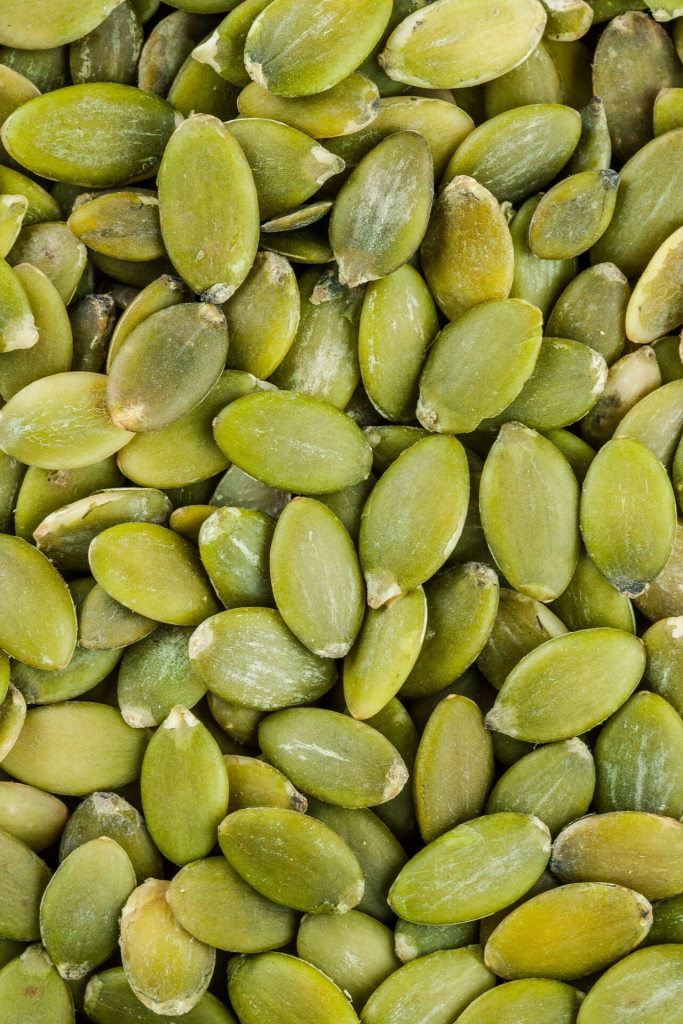Here is some background into pumpkin seeds’ potential mental health benefits, including their impact on mood, anxiety, and depression.
After the first year of COVID, anxiety and depression prevalence increased by 25% across the globe.
Last month was Mental Health Awareness Month, which is a great reason to stop and remember that conversations around mental health are so important especially in this day and age. As a dietitian, I’m always eager to learn more about the connection between different foods and their impact on our physical and mental health.
If you’re on this site, I hope it’s obvious how much I like all things pumpkin, including pumpkin seeds which is why I’m excited to dive into this topic about pumpkin seeds and their mental health benefits.
Let’s talk more about this small but mighty seed and what you need to know about how they can potentially benefit your mental health. Be sure to also check out my recipes using pumpkin seeds linked below.
This article is in no way meant to treat or diagnose a medical condition.

Pumpkin Seeds’ Benefits for Your Brain
Pumpkin seeds contain valuable nutrients that can benefit your brain and mental health. Over the past several decades, researchers have taken a deeper dive into the connection between pumpkin seeds and mental health, and have found several factors that can make a positive impact.
Since the brain is responsible for mood regulation, eating nutritious foods that can benefit brain health is becoming more and more important.
General Nutrition of Pumpkin Seeds
The nutrients in pumpkin seeds can contribute to the mental health benefits we’ll dive into more below. Here is the nutrition of pumpkin seeds per 1 oz of pumpkin seeds (equivalent to about 85 kernels).
| Nutrient | Value per 1oz of pumpkin seeds |
| Calories | 158 |
| Carbohydrates | 3g |
| Protein | 9g |
| Fat | 14g |
| Fiber | 1.7g |
| Magnesium | 168mg |
| Iron | 2.5mg |
| Zinc | 2.2mg |
| Potassium | 229mg |
| Tyrosine | 309mg |
| Tryptophan | 163mg |
RDA = Recommended Daily Allowance; AI = Adequate Intake
Do Pumpkin Seeds Improve Mood?
Pumpkin seeds may in fact have a positive effect on mood due to these important nutrients, though more research is needed. There needs to be more thorough research specifically around their connection to anxiety, stress, and depression.
The iron in pumpkin seeds may also contribute to improved mood. Iron is required for the enzymes that break down tyrosine and tryptophan to produce dopamine and serotonin, two feel-good hormones we’ll be talking more about later.
Pumpkin Seeds and Anxiety & Stress
The tryptophan and tyrosine in pumpkin seeds seem to play one of the most beneficial roles, as they are the precursors to serotonin and dopamine. Both serotonin and dopamine are known to play a role in regulating anxiety and stress.
Here are a few other ways the nutrients in pumpkin seeds may benefit anxiety and stress reduction:
- Magnesium: The magnesium in pumpkin seeds may play a role in stress reduction because magnesium can help reduce blood sugar and blood pressure, as well as serve as a nervous system relaxant.
- Some research has indicated that stress can reduce magnesium levels, and a magnesium deficiency can increase susceptibility to stress. To break this cycle, it’s important to include magnesium-rich foods in the diet, such as pumpkin seeds.
- Potassium: Potassium also plays a role in regulating blood pressure. We know that stress can increase blood pressure, so targeting foods that can help lower blood pressure may be beneficial.
Are Pumpkin Seeds Good for Depression?
Research is promising. Dopamine and serotonin play an important role in depression, and recent research that took a closer look at antidepressant foods found that pumpkin seeds had an antidepressant food score (AFS) of 47%. This benefit was believed to be most closely tied to the amount of tryptophan in the seeds. This score qualified pumpkin seeds as a food with antidepressant potential.
Additionally, research also shows that zinc deficiency can lead to depressive-like symptoms. Consuming 1 oz. of pumpkin seeds can provide 27.5% of women’s daily zinc needs, and 20% of those for men to help meet your nutrient requirements to prevent deficiency.
Pumpkin Seeds and Tryptophan: Impact on Serotonin Levels
Tryptophan is an amino acid that can be found in foods, and is a precursor to serotonin.
In one particular study, people who consumed tryptophan (>10 mg/kg body weight/d) from a mix of tryptophan containing foods including pumpkin seeds showed a statistically significant positive effect on depression, irritability, and anxiety in comparison to when they consumed lower levels of tryptophan (<5 mg/kg body weight/d).
Adults 19+ should aim to consume 4mg of tryptophan per kilogram of body weight per day. So, for a 140 pound adult, this would be 254mg per day. A 1oz serving of pumpkin seeds meets nearly half of this need.
While more research is needed, many studies have shown that increasing intake of foods with tryptophan can have a positive effect on serotonin levels.
Pumpkin Seeds and Tyrosine: Impact on Dopamine Levels
Tyrosine is an amino acid that you get from food. It is the precursor to dopamine, so it is believed that by increased food intake of tyrosine, you can in turn increase the levels of dopamine in your brain.
For adults 19 and over, the daily estimated amino acid requirement for phenylalanine and tyrosine is 27mg per kilogram of bodyweight per day.
For an adult who weighs 140 pounds, this would be 1,718mg of phenylalanine + tyrosine. A 1oz. serving of pumpkin seeds provides 309mg, 18% of your needs.
How Many Pumpkin Seeds Should You Have Per Day?
Pumpkin seeds aren’t the only food you should rely on to reach the recommend amount of tryptophan. Aiming for a 1 oz. serving pumpkin seeds is a good goal to help you meet nutrient requirements for several nutrients that play a role in mood regulation.
The good news is, they’re super easy to add to salads, sprinkle on top of yogurt bowls and oatmeal or add a handful to a homemade trail mix. You can even use pumpkin seeds to coat chicken or fish for an extra crunch.
So What’s the Verdict on Pumpkin Seeds & Mental Health
Unless you are allergic or have an intolerance, there is no harm in adding pumpkin seeds to your daily diet given the wide range of nutrients available. You may also be setting yourself to reap the benefits of the potential mental health benefits, including decreased anxiety and depression.
Fun Ways to Eat Pumpkin Seeds for Mental Health Benefits
Read more about the benefits of pumpkin seeds and how to roast and eat them.
Pumpkin seeds are so easy to use in a variety of ways — from sprinkling a handful on a salad, to topping baked goods with. Here are some of my favorite ways to use pumpkin seeds in these delicious recipe you don’t want to miss:

